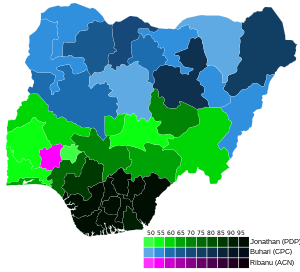| |||||||||||||||||||||||||||||
73,528,040 registered voters[1] 25% in each of 2/3 States + Majority[2] votes needed to win | |||||||||||||||||||||||||||||
|---|---|---|---|---|---|---|---|---|---|---|---|---|---|---|---|---|---|---|---|---|---|---|---|---|---|---|---|---|---|
| Turnout | 53.68%[1] | ||||||||||||||||||||||||||||
| |||||||||||||||||||||||||||||
 States won by Jonathan (in green), Buhari (blue), and Ribadu (purple) | |||||||||||||||||||||||||||||
| |||||||||||||||||||||||||||||
 |
|---|
|
|
Presidential elections were held in Nigeria on 16 April 2011, postponed from 9 April 2011.[3][4][5] The election followed controversy as to whether a northerner or southerner should be allowed to become president given the tradition of rotating the top office between the north and the south after the death of Umaru Yar'Adua, a northerner, when Goodluck Jonathan, another southerner assumed the interim presidency.
Immediately after the election widespread violence erupted in the northern, Muslim parts of the country.[6] Jonathan was declared the winner on 19 April.[7] However, international observers declared the election to be "orderly, free and fair" in the entire southern half of the country.[8]
- ^ a b "Voter turnout data for Nigeria". International IDEA. International Institute for Democracy and Electoral Assistance. Archived from the original on 5 May 2015. Retrieved 28 April 2015.
- ^ "Approved Guidelines and Regulations for the Conduct of 2015 General Elections" (PDF). Abuja: Independent National Electoral Commission. January 2015. Archived from the original (PDF) on 21 January 2015. Retrieved 21 January 2015.
- ^ "Nigeria to hold presidential election on 9 April". BBC News. 23 November 2010.
- ^ Nigeria’s General Elections Postponed From January To April As A New Voter Registration Software Is Released By The Inec All West Africa News Archived 2 December 2010 at the Wayback Machine
- ^ "Nigeria Elections postponed for second time". Aljazeera News. 3 April 2011.
- ^ "Jonathan rival rejects vote result as thousands flee Nigeria unrest". Daily Nation. Kenya. 20 April 2011. Retrieved 21 April 2011.
- ^ Purefoy, Christian (19 April 2011). "Widespread election violence erupts in Nigeria". CNN. Retrieved 20 April 2011.
- ^ "Jonathan rival rejects vote result as thousands flee Nigeria unrest". 3 July 2020.


